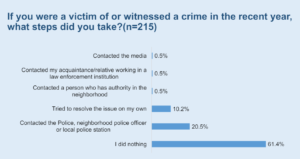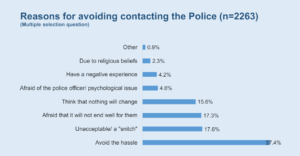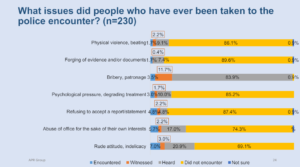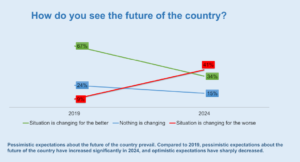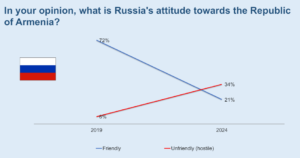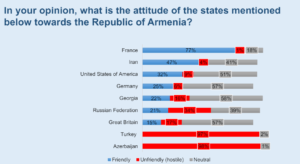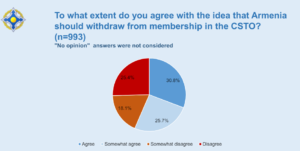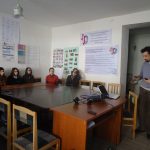- 26 March, 2024
- Announcements
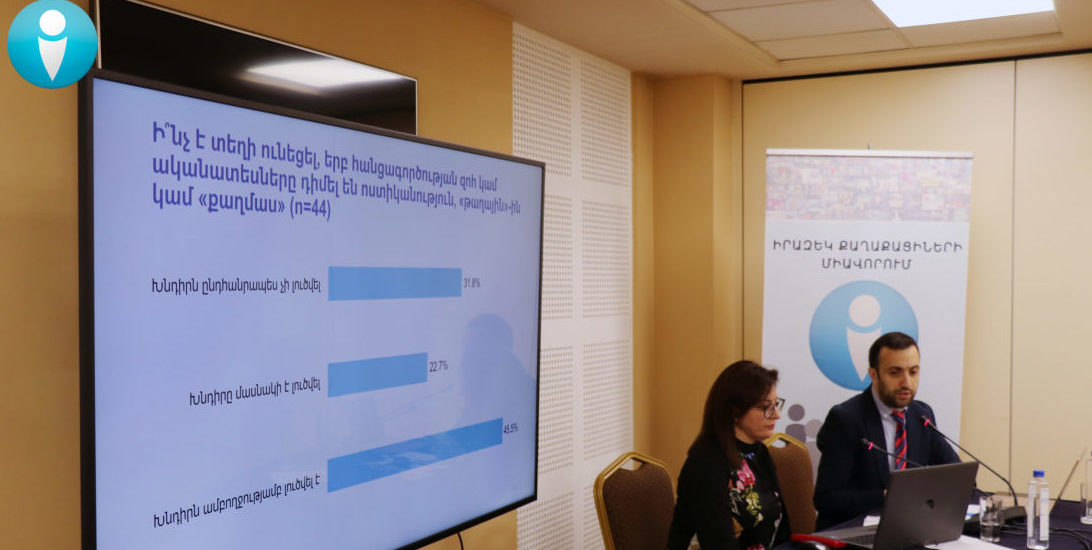
On March 26, 2024, results of the study on the public perception and attitude towards the law enforcement system, foreign policy of the Republic of Armenia and media literacy of the population of Armenia, conducted by the Advanced Public Research Group NGO and ordered by the Union of Informed Citizens NGO, were presented by the representatives of the aforementioned organizations.
The study was conducted through a survey with 1,200 respondents from all regions of the Republic of Armenia and the city of Yerevan.
Law enforcement system and Police
The survey results revealed a number of problematic issues in the law enforcement system and in the public attitude. In particular, 44 percent of the repondents believe that the status of the driver affects the attitude of the patrol service officers.
The results of the survey also indicate that when falling victim to a crime or witnessing it, citizens are not so inclined to report it to the law enforcement authorities. Only 20.5 percent of respondents stated that they turned to the Police.
Respondents mentioned undue hassle (37.4 percent) as the main reason for avoiding contacting the police, while 17.4 percent reported that it is unacceptable to go to the police because they will be perceived as snitches, and another 17.3 percent are worried that if they do contact the police, it may not end well for them.
Survey respondents who have ever been to the police station mentioned encountering negative phenomena there (19.6 percent). Moreover, more than 42 percent of citizens who have ever had contact with the police will not turn to the police if they witness a crime.
Nevertheless, most of the survey respondents (around 90 percent) consider that citizens should still help the police.
Foreign policy
Unlike the data on law enforcement and the Police, we had the opportunity to compare the data on foreign policy, and media literacy and media consumption with the findings of the 2019 survey.
As for foreign policy, the most vivid change constitutes the opinion of the citizens regarding the future of the country. In 2019, 67 percent of the survey respondents believed that the situation in the country is getting better, while now only 34 percent of the respondents think so. Similarly, only 9 percent of the 2019 survey respondents believed that the situation is getting worse, while currently 41 percent of the respondents think so.
The change in respondents’ opinion about Russia is also significant. In 2019, 72 percent of the survey respondents considered that Russia has a friendly attitude towards Armenia, while only 21 percent of the recent survey respondents think so. Conversely, in 2019, only 6 percent of respondents considered Russia’s attitude towards Armenia to be hostile, while currently that figure amounts to 34 percent. At the same time, around 70 percent of respondents believe that Russia continues to be influential both on the global and regional scale.
According to the perception of the survey respondents, France, Iran and India are the leading countries with a positive attitude towards Armenia, with Germany, USA and Georgia also perceived to be positively inclined. According to the findings of the survey, the leading countries with a negative attitude towards Armenia, are Turkey, Azerbaijan and Russia.
About 29 percent of respondents believe that French troops should be deployed in Armenia, 19 percent – Russian troops, and about 13 percent – American troops. According to 33 percent of respondents, there should be only Armenian troops in Armenia.
According to 45 percent of respondents, the European Union Monitoring Mission in Armenia has a positive role, while 11 percent think it has a negative role. Meanwhile, only 21 percent of respondents consider the CSTO’s role in Armenia positive, 33 percent considering it as negative. However, only about 57 percent of respondents are in favor of Armenia leaving the CSTO, 43 percent being against it.
As for the loss of Nagorno-Karabakh, respondents think that the blame is equally shared by the authorities of Nagorno-Karabakh and the former and current authorities of the Republic of Armenia. Only 25 percent of the respondents indicated the change in the overall geopolitical situation as the reason for the loss of Nagorno-Karabakh.
Media
Unlike the data on the foreign policy, there were no significant changes in the data related to the media and media consumption compared to the 2019 study.
We can state that the Internet has increased its weight as a source of information compared to television.
The indexes related to media literacy, verification of the reliability of information, literate consumption and distribution of information have increased, the media literacy index in terms of the ability to search for information has decreased.
Just like in 2019, the most popular TV stations are Armenia TV, Shant TV and Public TV, while Russian state TV channels rank 5th and 8th.
The most reliable radio station and internet website is Azatutyun radio station.
Among social networks, respondents prefer Facebook, YouTube, Telegram and Instagram, while considering TikTok an unreliable source for information. Moreover, around 23 percent of the respondents discuss domestic and foreign political issues on the Internet, while about 14 percent discuss socioeconomic issues.
The research study was funded by the National Endowment for Democracy (NED). You can read the full version of the study here.


 Հայ
Հայ Рус
Рус